Types of air conditioning filters – Refrigerated systems
Air filtration is one of the most important aspects of your ducted air conditioning unit. Without it, your air conditioning unit will suck up and distribute dust, dirt and pollen throughout your air conditioning system and your home. Regular cleaning/replacement of your air conditioning filter will ensure clean healthy air and can also save up to 15% of the electricity cost to operate your air conditioning system.
Every time your air conditioning unit is switched on, the fan starts up and recirculating the air in your home/office through the return air intake. For ducted units this is generally a large rectangular grille or vent in the ceiling but can also be installed in a wall or cupboard as well. This air is pushed through a radiator like coil within the ceiling space where it is conditioned and distributed throughout the ducting and to your vents. If the air sucked up into the return air grille is dirty, you will receive dirty air from your vents.
The downside to having a filter on the return air grille is that it will eventually clog as it catches pollutants from the air. This will cause a restriction in your air conditioning system resulting in a reduction of air flow and poor performance from your unit. This is why it’s critical the filter is regularly cleaned.
Regular filter cleaning/replacement can save up to 15% of the energy cost to operate your air conditioning system.
Leaving your air conditioning system without a filter is also a big mistake. Running your unit without a filter is detrimental to the air quality in your home as the dirty air will eventually clog the radiator coil in the roof. This will drastically reduce performance and efficiency of your unit and could cause damage to other components like the indoor fan motor. The work involved to dismantle the indoor unit and clean the coil can be costly and can easily be avoided with the right filter.
Washable ducted air conditioning filters
Net or Mesh material filters (AKA rock catchers)
These filters are the cheapest form of filter available. They are affectionately called ‘rock catchers’ due to the low capacity of filtration eg ‘they could only catch a rock’. This filter will stop large debris such as hair and rubbish (and rocks) but provide very little particle filtration.
Pros
- None really. Can be used as a pre-filter in some applications when a secondary filter is installed.
Cons
- Very little filtration.
- Cannot catch pollutants such as dirt and pollen which can cause allergies and hayfever.
- Not recommended for any use other than pre-filtration.
Tips and Hints
- Get rid of this filter and use something better!
Material Filters
This filter is most commonly used in domestic and light commercial applications. The material is made from a breathable fabric and is capable of filtering the air of all large debris and some smaller particles. New material can be purchased from most air conditioning suppliers in Adelaide and are relatively easy to change DIY with the use of a fly screen roller and a pair of sharp scissors.
Pros
Cheap to replace and DIY installation is relatively easy.
Material is easily available.
Washable with water.
Cons
- Cannot filter allergens and very fine dust particles.
- Can be messy to clean…especially when you think the most common caught particle in a filter is dead skin cells!
- Not ideal for use when the occupants suffer badly with allergies and hayfever.
Tips and Hints
- Wash this filter every 3-6 months, ideally before Summer and Winter, to ensure optimum performance of your air conditioning system.
- Use a garden hose and wash from top to bottom, left to right on both sides.
- Replace the material every 2-3 years. This material will become loose and worn over time but can be easily replaced DIY.
- Use a dust mask when cleaning……one of the most common particles on a dirty filter is dead human skin cells!!
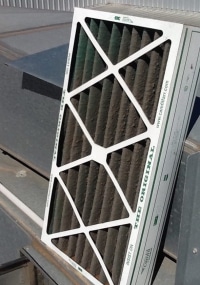
Block disposable cardboard filter
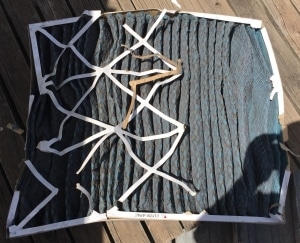
Blocked and broken disposable air conditioning filter
V-Form Filters – eg. Air Clean Filters
The domestic V-Form filter market is relatively new in Australia and combines the filtration of a commercial grade filter but can fit into most domestic return air grilles. These filters are specifically designed to filtrate the air extremely well and up to 10x better than the netted and material type of filter material. With easy installation into most existing ducted air conditioning in your home, these filters surpass any other domestic filter available.
Pros
- High level of filtration. Can catch pollutants as small as .3 microns which is .3 of a millionth of a meter. A human red blood cell is 5 microns!
- Larger surface area up to 2.5x larger than the netted of material filter. This will increase airflow and performance.
- Due to the larger surface area, the filter will be a lot quieter than conventional filters during unit operation.
- These filters are generally disposable which allows the pollutants to be thrown away instead of washed.
- DIY Friendly. These filters can be installed yourself with relative ease.
- Can be easily retro-fitted into most existing air conditioning system.
Cons
- These filter will generally only last up to 12 months but will vary depending on the application and hours of use.
- Cost is higher than conventional washable filters and are anywhere from $45.00 – $110.00 depending on size. Remember these filters need to be replaced yearly.
Tips and Hints
- Replace this filter atleast every 12 months. May require 3-6 monthly replacement when used in high traffic applications.
- Ensure you have the filter code printed on the side of the filter when re-ordering.
- Place the dirty filter in a garbage bag to catch any debris that may fall off the filter when handling.
Click here for more information on the Air Clean filter.
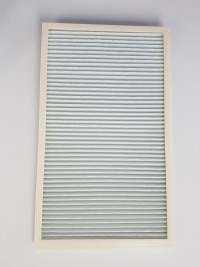
Air Clean filter
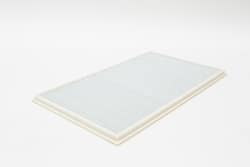
Easily adaptable slide edging
Hi-Wall, Ceiling Cassette and RAC
Washable filters
Hi-Wall and RAC (Room Air Conditioners or Box Type wall air conditioners) filters are located in the front of the unit. Lift the front panel up and slide the filters out. Most air conditioning hi-wall units will have a finger hole or indent on either side of the panel to allow easy access to the filters. Insert fingers either side and pull up and out gently until the panel pops open. Sometimes the panel will have a central clip holding the panel closed. This clip will need to pop open to allow the panel to come free. Ceiling Cassette filters are located in the centre of the unit and are accessed by removing the centre panel. Some models actually contain an automatic lowering filter grille to make cleaning a breeze. Wash the filters with a hose or under a tap or shower head. Allow to drip dry before installing the filters back into the unit.
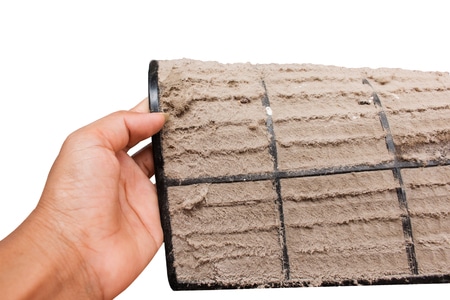
Blocked Hi Wall air conditioning filter
Tips and Hints
- Wash these filters atleast every 6 months. Ideally check the filter prior to Summer and Winter.
- If the air conditioner is installed near a Kitchen, check and clean the filters every 3 months to help prevent a build up of grease which is difficult to remove.
- Use warm water and a mild detergent to remove grease or stains.
- Use a dust mask when cleaning….. one of the most common particles on a dirty filter is dead human skin cells!!
Having trouble with your filters?
If you have trouble finding your air conditioning filter, require a replacement disposable filter or HealthEair filter? Please feel free to give us a call on 08 8296 7888 or click here to contact us online. We will be more than happy to assist in locating the correct filter and provide any additional advice we can.